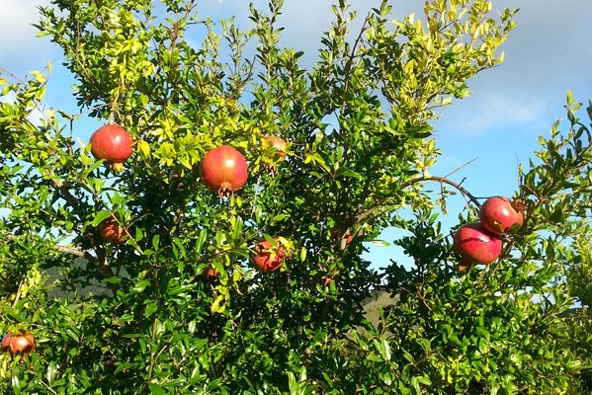Welcome to winter!
So you want to grow that tropical Pomegranate?
Punica granatum is likely to have originated from Persia or Central Asia; a closely related ancestor (Punica protopunica) came from Yemen.
The Pomegranate was quickly transported by humans throughout the Mediterranean basin, California and Asia; that was made possible by the fact that these trees are extremely adaptive to various climates and soil conditions. So yes, they would probably grow nicely in Canterbury on the port hills!
What made this fruit (and bark, leaves and flowers) so desirable was its medicinal use: bio-active chemicals (and anti-oxydants) were found to be anti-microbial and anti-bacterial and pretty useful in the battles with diabetes, high blood pressure and cancer. Not sure how much real scientific work has been put into these medicinal claims, but as per usual, in our modern language, this fruit became a “Super Food.”
Growing the Pomegranate tree/shrub
In full sun is best.
In any type of soil, but well-drained soil with organic material/compost gives best results.
I think that if you have rather wet soils, it may pay to “raise your bed” at least 30 centimetres to avoid inundation of the roots; Pomegranates can stand rather dry soils, which means you can water the plants when you have time – and use liquid fertiliser!
There is a dwarf variety called “Nana.”
It can be planted in a large pot and will grow to 1 meter high. Advantage: can be shifted to a warm spot to ripen the fruit in autumn. Use a good container mix with some slow-release fertiliser.
Grow them in an area where you get warm summers, slowly extending the nice temperatures to 6 or 7 months.
They're pretty resistant to cool winters, but require at least 6 months of warm temperatures to ripen the fruit.
Planting time.
In Auckland you can plant them in late autumn/early winter (soil temperatures are not too low and the soil not too wet); In Canterbury I would plant them in autumn when the soil is still relatively warm
You need patience.
Pomegranates need to get established into the soil first – they slowly start to put down their roots and create flowers on the next shoots. Don’t expect too much fruit in the first year or two.
Fertilisers and watering.
Not required in winter and early spring – you can ignore them! But once flowers have started to show, water the tree and chuck down some fertiliser (best to use “flowering fertiliser” for tomatoes or roses) and keep up the “care” to allow the fruit to ripen in autumn.
Pruning in winter: lightly prune to remove dead branches and keep the tree in shape.
Take your Radio, Podcasts and Music with you










